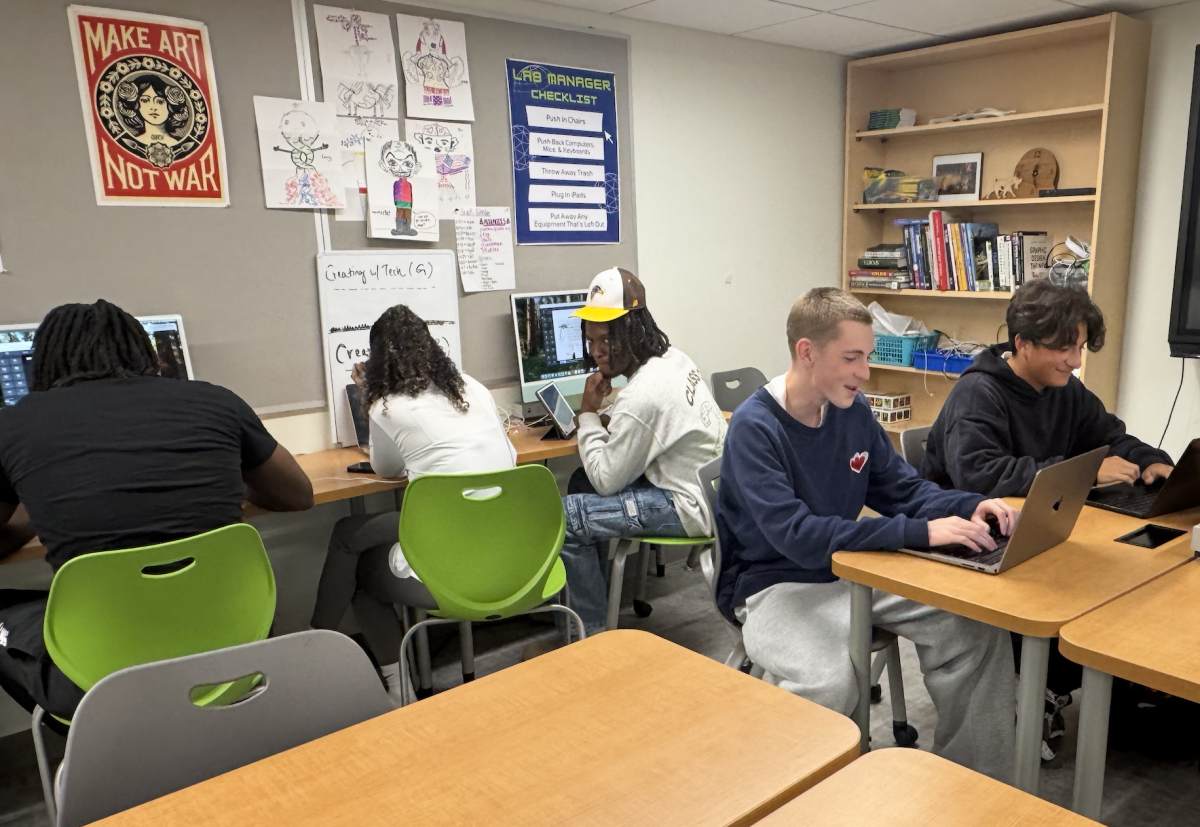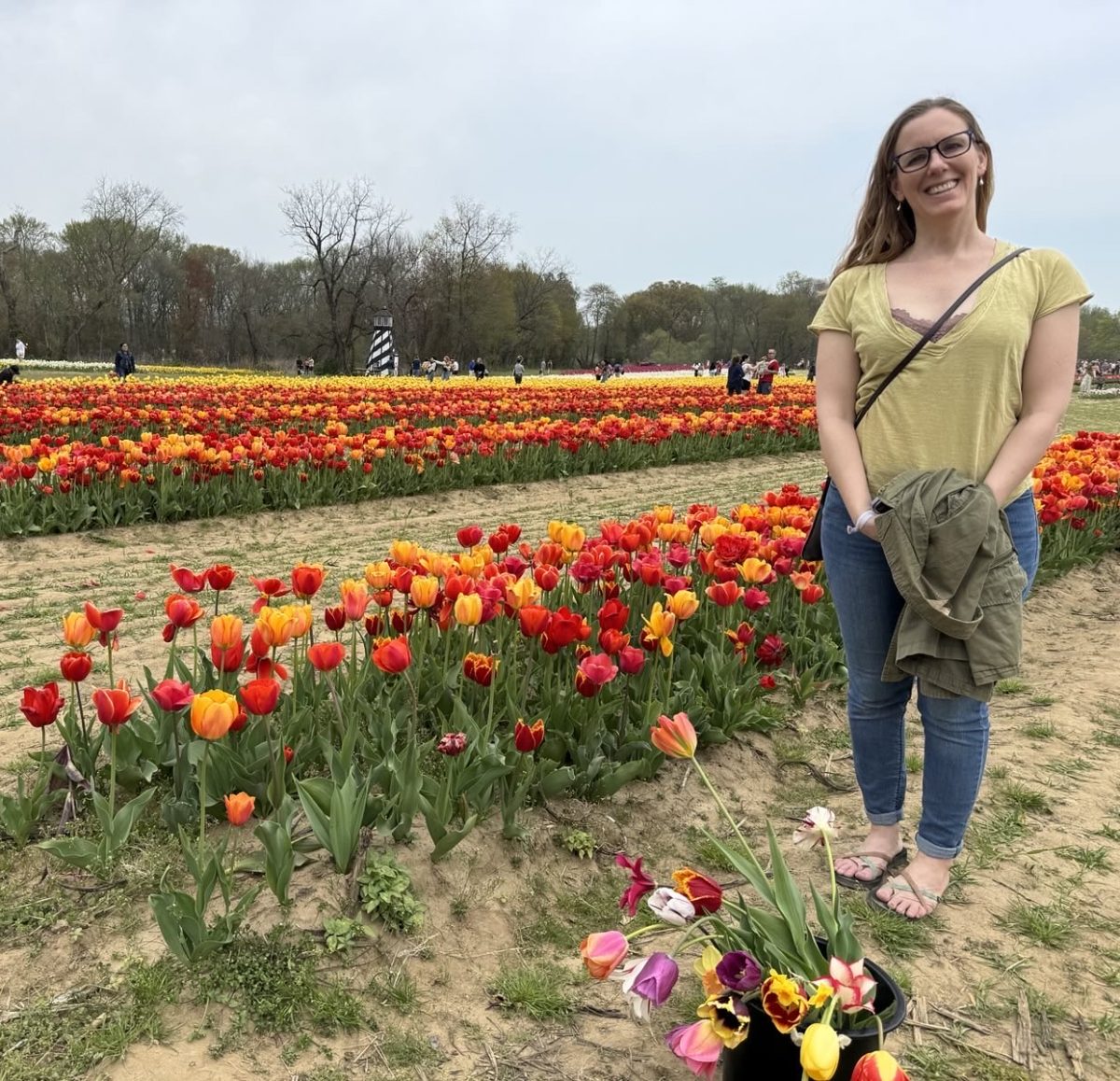The content in this article reflects the views and opinions of the student journalist and does not represent the views of The Falcon staff, student body, or school administration.
For four months a year, the Blauvelt Theatre is filled with the sounds of tapping character shoes, harmonized singing, and many moments of joy and collaboration as students work hard to produce an Upper School theatre production. But to these students, who spend up to 20 hours every week rehearsing, practicing, and learning, it’s apparent that Friends Select’s theatre program lacks in many ways, and their hard work isn’t given the due respect that it deserves.
Space Constraints
From the audience, the Blauvelt Theater space seems high-tech and luxurious. But from backstage, it’s unclear that the drama department was even considered when the theatre was remodeled. The Blauvelt seems as though it was built for assemblies, not stage productions: an allegory of the thought given to our theatre department. For one, we lack some resources that would greatly benefit the drama department, such as a fly system, full-range spotlights, and a sound system that can function when a performer has their hair down.
However, those demands are an ambitious wishlist, looking at the reality of performing in this theater, and these issues are more serious than the iffy acoustics. Behind the curtain, the actors and crew are tripping over each other, trying to move from stage right to stage left. There is no safe entrance directly to stage left, even though the gallery hallway theoretically has a door built for this purpose. During moments of high traffic backstage, it’s unfortunately normal to see 15-20 high school students stepping on each other’s feet trying to maneuver the tiny space. Add in the baby grand piano or a few acting blocks (our excuse for a set), and making your cue on time becomes a walking obstacle course. It’s a safety hazard, and it could easily have been avoided with a bit more thoughtful planning during the recent renovation of the theatre.
Shared Space
The Blauvelt Theater doesn’t just belong to the drama department; it’s a multipurpose space shared by the entire school community. FSS plays and musicals are no longer allowed to construct a proper set, because the theatre simply lacks the space or the willingness to accommodate this inconvenience for a few weeks. Assemblies are conducted multiple times per week for the Upper and Middle Schools. Additionally, multiple classes are held in the theatre each week, such as Upper and Middle School choir classes, and occasionally Drama classes.
In total, the Blauvelt can be used for up to 7 different purposes each day. It’s treated as a multipurpose space, because large numbers of students can fit there, but it’s the only place where actors can rehearse during the final moments of rehearsals. Drama Department productions should be prioritized.
How is it fair that the actors have to accommodate the choral risers during blocking and dance rehearsals, but the choir can’t rehearse with a theatrical set onstage for a few weeks of the year? Additionally, it’s a disservice to the stage crew. The crew does more than just support the actors: they are learning the skills of set design, technology, engineering, and construction. Their work deserves more than the canvas of a few recycled wooden blocks. They deserve to learn how to construct a set that is three-dimensional. If the request to prioritize our rehearsals and performances is unreasonable, I implore Friends Select to consider moving its productions to a nearby local theater space. It’s costly, yes, but it would provide so many benefits for young performers and creatives. Besides, the school utilizes local resources for its athletics teams all the time. We don’t own a river or a baseball field, but the crew and baseball teams don’t use FSS’s campus when it is inappropriate. We find a way to make sure they have adequate space and resources to perform to the best of their capabilities. Theatre artists should be afforded the same opportunities.
Costuming Difficulties
A large portion of the costumes and props you see onstage each production come from the cast and crew’s personal wardrobes and homes. This is not only inconvenient: it is limiting. Friends Select occasionally hires an outside costume designer, though most of the time, costumes are managed by teachers and students who lack professional experience. In most productions, such as Almost, Maine, the 2024 Fall production, the costume crew has been completely made up of students who are given little guidance on how to design costumes or do performers’ hair and makeup. When the costumes team is student-run, almost every costume piece comes from the actor’s personal closet. However, high school students don’t usually own clothing items reminiscent of a time period other than 2025. Gender-blind casting is also very common in FSS theatre productions, but students also don’t typically have access to an extensive opposite-gender wardrobe.
Even with the addition of a professional costume designer, FSS doesn’t have a very large or particularly diverse costume selection for them to choose from. Oftentimes, costume pieces do not match the show, are extremely inconvenient to manage during quick changes, or do not fit the actors properly. The recent production of Curtains utilized resources in a way that I would love to see continue. Our team brought in professional costume designer Josephine Siu, who rented costume pieces from local theatre companies and colleges. These costumes were appropriate for the show and for the actors, and were specially designed with features like Velcro and snaps that made quick changes much easier than with clothing not meant to be a costume. She also has experience with tailoring and carefully altered costume pieces so that they fit the actors. However, the FSS finance team compensated Siu for only one-third of her labor. This is unfair to her, and I would not be surprised if she saw no incentive to work with our school again. Siu brought loads of expertise and professionalism to our recent production, and if FSS cannot build up a comprehensive in-house wardrobe selection, hiring an outside costume designer with contacts at other theatre programs, such as Siu, would be the way to move forward.
A Rushed Timeline
Finally, the rehearsal period for each production is approximately two months from auditions to closing night. Two months might be a suitable timeline for a semi-professional theatre company capable of rehearsing on a more intense schedule. But, for a school theatre production that rehearses for 2 hours each weekday, the timeline feels rushed. From personal experience, in the last week of rehearsals, many actors feel underprepared to perform for an audience. In other high schools, it’s common to see the rehearsal process last 8-12 weeks for a straight play and over three months for a musical. But, with the constant usage of the theater and the inefficient timing of the middle school production, the upper school is limited to two months or less to get a show that is performance-ready. In both the fall and spring productions of the 2024-2025 school year, the first full run-through of the performance occurred on opening night, in front of a full live audience. This is stressful for the performers and crew, inconvenient for guardians picking up their students, and opens up room for avoidable mistakes.
Friends Select’s theatre department is full of passionate, talented students who come together to create art that they feel proud to present to their friends and family. If the school truly prides itself on enabling creative expression, it should afford more time, thought, and resources to these hardworking students and faculty involved.































